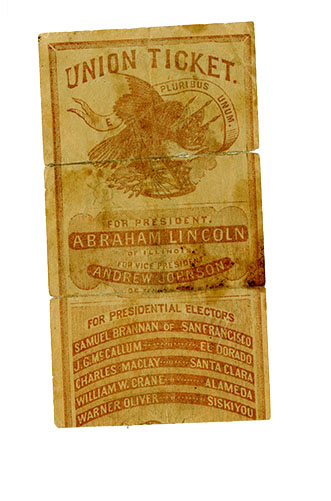- Catalog No. —
- Mss 1513, Box 1, Folder 2
- Date —
- 1864
- Era —
- 1846-1880 (Treaties, Civil War, and Immigration)
- Themes —
- Government, Law, and Politics
- Credits —
- Oregon Historical Society
- Regions —
- None
- Author —
- National Union Party
National Election Ticket, California, 1864
This election ticket from California is from the 1864 presidential election, when Republican incumbent President Abraham Lincoln faced Democratic challenger Gen. George B. McClellan—Lincoln’s former commander of the army whom he relieved of duty in 1862. The Republican Party decided to choose a new running mate for Lincoln, and they nominated Democrat Andrew Johnson (Tennessee) whose Southern sympathies were tempered by his declarations of support for the Union. All of the states still in the Union in 1864 had flyers like this one which listed not only the national candidates, but the state electors who could be counted on to cast an electoral vote for the Union Party ticket.
In Oregon, Republican Party members adopted the national strategy of coalitioning with War Democrats under the Union Party label. The Democratic Party in Oregon—as in most of the country—had not quite recovered from its 1860 split among those who opposed secession and supported the war (War Democrats), those who wanted to negotiate the South back into the Union (Peace Democrats or “Copperheads”), and those who supported the right of the South to secede. Lincoln had benefited from this split in 1860 when Democrats could not concentrate their votes behind a single Democratic candidate. Democrat Stephen Douglas took 28% of the Oregon vote; proslavery Southern Democrat John Breckinridge (with former Oregon territorial governor Joseph Lane as vice president) took 34%; and Lincoln squeaked by with 36%. In 1864, however, the Democratic Party began to rally behind Peace Democrat McClellan, and Lincoln contemplated defeat.
The creation of the National Union Party gave non-secessionist Democrats a way to vote for the salvation of the Union without becoming Republicans, and many joined the secret organizations called Union Leagues alongside their Republican neighbors. That political maneuvering helped Lincoln win the election and earn a second term. Oregon voters split somewhat evenly: 53% voted for Lincoln, 46% for McClellan. Oregon, however, had been a majority Democratic state, which meant that many Oregonians who had voted for a Democratic candidate in 1860 decided to vote Union in the very next election, thereby rejecting both secession and peaceful negotiation with the South.
Written by Amy E. Platt, 2014
Further Reading:
Etulain, Richard W. Lincoln and Oregon Country Politics in the Civil War Era. Corvallis: Oregon State University Press, 2013.
